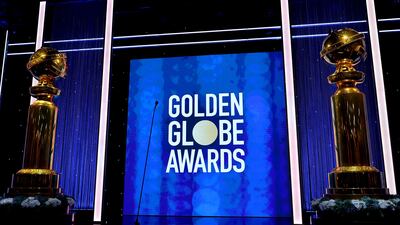The outbreak of the Omicron variant of Covid-19 could hardly have come at a better time for the Hollywood Foreign Press Association, the organisation behind the annual Golden Globe Awards. Still reeling from a 2021 that saw it slammed over the lack of diversity of its voting members, placed under the spotlight over allegations of bribery and “inappropriate gifts” influencing voting decisions, and with several celebrities publicly distancing themselves from the awards — Tom Cruise even returned his three Golden Globes for his roles in Magnolia, Jerry Maguire and Born on the Fourth of July — the Golden Globes went ahead in a private event last night.
There must at the very least have been a palpable sense of relief at the HFPA that this year’s non-event — with no red carpet, no TV broadcast, no celebs, and no outside media in attendance — could be blamed on the latest Covid developments. Instead of the usual glitzy show, this year saw a handful of HFPA members attend a low-key ceremony in the ballroom of the Beverley Hilton Hotel. The 90-minute event was not even live-streamed. Instead, fans eager to follow this year’s winners had to keep an eye on the HFPA’s social media feeds to keep up to date with what The New York Times disparagingly referred to as a “glorified Power Point presentation.” Variety reported last week that the Globes had approached several agencies in the hope of securing celebrity presenters, but none had agreed to take part. Essentially, the Omicron excuse allowed the Globes to dodge a bullet. By hiding away, however, this year’s event has also denied a voice to those who could perhaps have convinced us that things are genuinely changing at the HFPA.
This year’s winners were by and large a fairly safe list, perhaps unsurprisingly after a year dogged by controversy, but there were some notable wins for diversity. Jane Campion became only the third female director to claim the Best Director prize, for The Power of the Dog, Will Smith picked up a Best Actor nod for his role in the Williams sisters biopic King Richard, and prizes for Best Actress and Supporting Actress for West Side Story’s Rachel Zegler and Ariana DeBose brought some Latin flair to proceedings. Thanks to the secretive nature of this year’s event, however, these winners were denied the opportunity to tell us how they feel about the state of affairs at the HFPA. How do they feel about winning their prizes when the organisation is under such scrutiny? Do they sense a genuine appetite for change at the organisation? Would they have turned up to collect their prize at all if they had been invited?
The HFPA has undeniably made changes, both in terms of the diversity of its voters and in limiting the number of free holidays available to members at studios’ expense. It will doubtless be at pains to point out the historic significance of this year’s event — the first time the awards have been voted on by its new, [more] diverse judging panel, a year that saw a woman win Best Director and a black actor take Best Actor — but history, by its very nature, requires documenting. With no TV show, no live-stream, and not even any external media in attendance to record the evening’s events, it’s the kind of history that will be swiftly forgotten.
Awards shows are all about those unforgettable moments that live on in popular folklore: Faye Dunaway mistakenly naming La La Land as Best Picture before swiftly recanting and handing the award to the real winner, Moonlight, at 2017’s Oscars, or Jarvis Cocker gatecrashing the stage during Michael Jackson’s performance at 1996’s Brit Awards. Electric moments that have water coolers around the world abuzz the next day. It seems unlikely that too many office conversations today will start with the words “Did you see when the Golden Globes updated their website to say Hans Zimmer won Best Score for Dune? Amazing.”
By claiming to have made significant changes to the Globes’ whole outlook, but then denying a voice to anyone involved and getting the whole thing out of the way as quickly and quietly as possible with nothing preserved for posterity, the organisers would seem to have opened up a debate about whether they’re really serious about the changes at all.
Have the HFPA acted out of a genuine sense of contrition and desire to evolve, or simply because the bad press was becoming untenable — would any of this have happened at all had NBC not dropped the show from its schedule? The broadcaster has left the door open for the Golden Globes to return to TV screens next year, but it looks like a lot of Hollywood stars may yet need some convincing if next year’s event is to be the kind of star-studded Hollywood glamour-fest that makes it worth televising in the first place.

